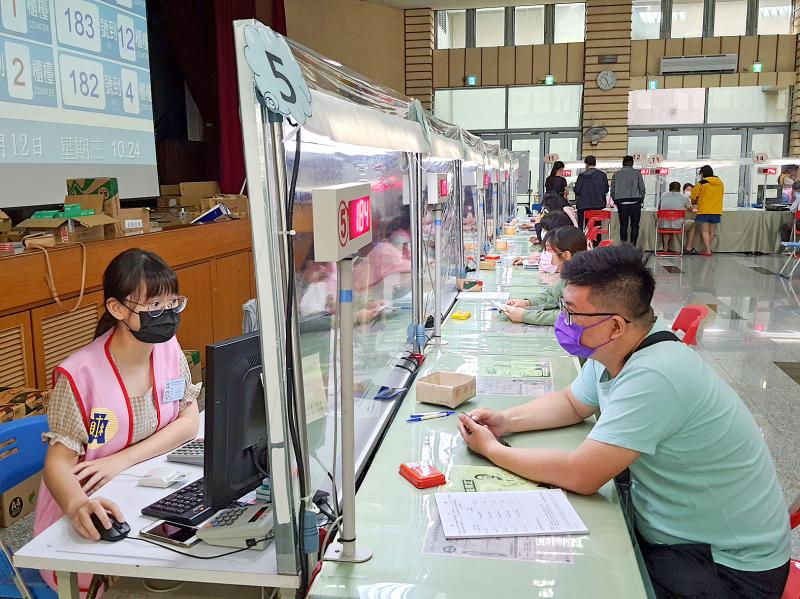The deadline for filing tax returns for last year and making payments has been extended by a month, to June 30, in part to prevent crowding at National Taxation Bureau offices amid a COVID-19 outbreak, the Ministry of Finance said on Wednesday.
The extension applies to individual and business filings, it added.
The ministry made the announcement hours after Minister of Health and Welfare Chen Shih-chung (陳時中) said that the Central Epidemic Command Center (CECC) might raise the domestic COVID-19 warning to a near-lockdown level over the next few days.

Photo: Hung Mei-hsiu, Taipei Times
If the domestic warning is raised from level 2 to level 3, indoor gatherings of more than five people and outdoor gatherings of more than 10 people would be prohibited, said Chen, who head’s the CECC.
If the alert level is raised, people would not be able to file their tax returns in person, so the deadline needed to be pushed back from May 31 to June 30, the ministry said.
The extension would hopefully help to prevent crowding at tax offices across the nation, the ministry said, encouraging people to file their returns online.
However, the June 30 deadline does not apply to property taxes, which people are encouraged to pay online after receiving their bill from the tax bureau, the ministry said.
As of Sunday, more than 2 million people, or about 30 percent of the nation’s taxpayers, had filed their returns, ministry data showed.
Last year, the ministry also extended the tax deadline due to the COVID-19 pandemic.

NEW IDENTITY: Known for its software, India has expanded into hardware, with its semiconductor industry growing from US$38bn in 2023 to US$45bn to US$50bn India on Saturday inaugurated its first semiconductor assembly and test facility, a milestone in the government’s push to reduce dependence on foreign chipmakers and stake a claim in a sector dominated by China. Indian Prime Minister Narendra Modi opened US firm Micron Technology Inc’s semiconductor assembly, test and packaging unit in his home state of Gujarat, hailing the “dawn of a new era” for India’s technology ambitions. “When young Indians look back in the future, they will see this decade as the turning point in our tech future,” Modi told the event, which was broadcast on his YouTube channel. The plant would convert

‘SEISMIC SHIFT’: The researcher forecast there would be about 1.1 billion mobile shipments this year, down from 1.26 billion the prior year and erasing years of gains The global smartphone market is expected to contract 12.9 percent this year due to the unprecedented memorychip shortage, marking “a crisis like no other,” researcher International Data Corp (IDC) said. The new forecast, a dramatic revision down from earlier estimates, gives the latest accounting of the ongoing memory crunch that is affecting every corner of the electronics industry. The demand for advanced memory to power artificial intelligence (AI) tasks has drained global supply until well into next year and jeopardizes the business model of many smartphone makers. IDC forecast about 1.1 billion mobile shipments this year, down from 1.26 billion the prior

People stand in a Pokemon store in Tokyo on Thursday. One of the world highest-grossing franchises is celebrated its 30th anniversary yesterday.

Zimbabwe’s ban on raw lithium exports is forcing Chinese miners to rethink their strategy, speeding up plans to process the metal locally instead of shipping it to China’s vast rechargeable battery industry. The country is Africa’s largest lithium producer and has one of the world’s largest reserves, according to the US Geological Survey (USGS). Zimbabwe already banned the export of lithium ore in 2022 and last year announced it would halt exports of lithium concentrates from January next year. However, on Wednesday it imposed the ban with immediate effect, leaving unclear what the lithium mining sector would do in the